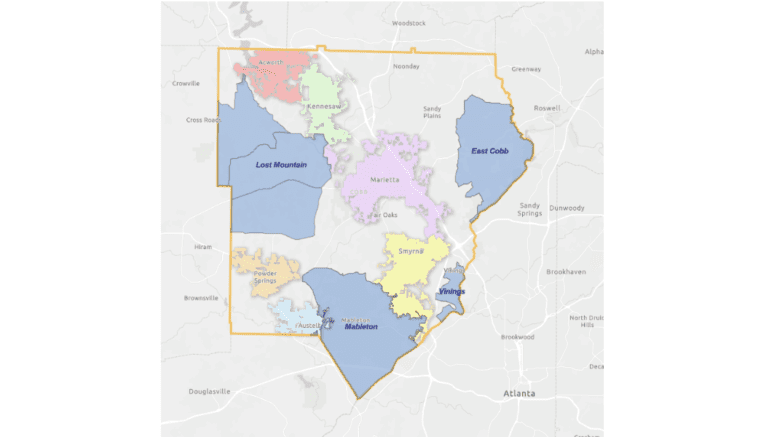By John A. Tures, Professor of Political Science, LaGrange College
Last year, the bid for Lost Mountain to become its own city failed. Supporters of such a plan are back, with a redrawn map that’s a bit smaller, in the hopes of greater success at a second referendum, though it still contains a number of residents who would prefer being under Cobb County’s jurisdiction. Does it fit a broader pattern in the South, and even this country, on the topic of secession? I look at the data to see what’s up, and where all of this is going.
“Four cityhood movements arose last year in Cobb, three of them in wealthier, whiter and more conservative areas like West Cobb,” wrote Taylor Croft with the Atlanta Journal-Constitution (Lost Mountain cityhood is back in Cobb County (ajc.com)). “Those were largely propelled by fears of development and a desire for local control over planning and zoning in an increasingly diverse, Democratic-controlled county. Voters, however, rejected all three of the conservative-led efforts, and only approved the overwhelmingly Democratic city of Mableton at the ballot box.”
Lost Mountain’s proposal was defeated by 58% of the voters. That may not sound like much, but it’s not far from Ronald Reagan’s victory margin in the 1984 Election. Political Scientists mark 55% or a 10-point margin as a landslide. The new map, designed to have a more pro-cityhood tilt, will nevertheless have precincts that voted against Lost Mountain, because no one region in the proposed are voted in significantly higher numbers, for the split.
“Do you want to have folks influencing and making decisions about your backyard that you can vote for,” state representative Ed Setzler of Acworth said in Croft’s article. But if the new area is supposed to offer less services than what was proposed last year, it almost begs the question why it’s even being considered in the first place.
Perhaps it’s because America is allegedly catching “secession fever.” According to Newsweek and The Hill, a 2021 poll indicated as much. “Shocking poll finds many Americans now want to secede from the United States.” The actual number who said yes to such a measure is 37% (https://thehill.com/changing-america/enrichment/arts-culture/563221-shocking-poll-finds-many-americans-now-want-to/). The only group where a majority wanted to secede was among Southern Republicans (66%) with independents the only other group to express preferences topping the 50% mark (right at 50%), though West Coast Democrats are only a few points lower.
I took a closer look past the hype to find out more. As the survey administrators caution (which rarely could be found among the sensationalistic headlines “We caution that this survey item reflects initial reactions by respondents about an issue that they are very unlikely to have considered carefully. Secession is a genuinely radical proposition and expressions of support in a survey may map only loosely onto willingness to act toward that end.” And it’s at the top of the report, so other news organizations should have seen it (Still miles apart: Americans and the state of U.S. democracy half a year into the Biden presidency | Bright Line Watch).
Also absent from such studies is the overwhelming role in which foreign propaganda, especially from Russia is either creating or amplifying existing groups on the fringe (Inside the Russian effort to fuel American secessionists – ThinkProgress), with evidence strong enough to stand up in a U.S. court (Russian accused of influencing US political groups is indicted | CNN Politics).
No evidence shows this is linked to Lost Mountain, of course. But it does illustrate the importance of figuring out who’s driving a separatist movement and the motives of the group pushing for independence, or a different type of political arrangement.
John A. Tures is a professor of political science at LaGrange College in LaGrange, Georgia. His views are his own. He can be reached at jtures@lagrange.edu. His Twitter account is JohnTures2.
